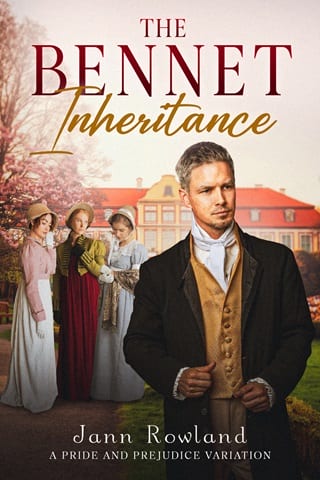Chapter XXVIII
A n observer of Miss Caroline Bingley would be surprised by her behavior after the night at the assembly. Or perhaps the surprise would not be so profound, for Caroline had always kept her feelings under careful regulation. Louisa, who knew her sister well, had not expected Caroline to fly into a rage when confronted with the reality of Mr. Darcy's interest in another woman, but she might have expected her sister to make some attempt to protect what she thought was her territory.
? Yet Caroline had not, instead choosing to watch and wait. She had even grown closer to Miss Elizabeth, her rival for Mr. Darcy's affections. As Louisa still did not know what to make of Mr. Lucas's attention to Caroline and her sister's feelings concerning them, she did not consider it for the moment. In the wake of the Bennet sisters' return to Longbourn with Georgiana, however, Louisa thought it likely that her sister would speak on the subject, though what form that would take was difficult to decipher. As Louisa expected, Caroline opened the subject with alacrity.
? "This stay in Hertfordshire has not proceeded as I had expected."
? Charles, who had been contemplating something only he could see in the wallpaper, looked up at Caroline's declaration, though that was not the correct word—it had been more of a thought spoken out loud in an absence of mind.
? "In what way?" asked Charles, though suspecting the contents of Caroline's thoughts.
? Caroline waved her hand, an ineffectual attempt to explain her meaning. Louisa and her brother noted it and grinned, inciting a trace of Caroline's ire.
? "Do not play the simpleton, Charles," said Caroline. "It does not become you."
? "Perhaps it does not," agreed Charles. "But I would still ask you to explain yourself."
? For a long moment, Caroline considered him; or it may have been an attempt to work out what she wished to say. Whatever it was, several moments passed before she summoned a reply.
? "Would it surprise you both to know that I had dreams of Mr. Darcy proposing to me during our stay here?"
? To laugh at Caroline's admission would be a mistake, for Louisa knew it would offend her. Charles too appeared to realize this, for he regarded Caroline before responding, his answer considered.
? "Yes, Caroline, I suspect Louisa will join with me in saying we had some notion of it. You take care to maintain propriety, but those of us who know you understand your wishes toward Darcy."
? "As Elizabeth informed me," said Caroline with a grimace. "I can only hope I did not make too much of a fool of myself."
? "Do not concern yourself, Caroline," replied Louisa. "Mr. Darcy knew of it, of course, but I think you maintained enough mystery toward society that while most suspected your ambitions, you did not invite censure."
? Though Caroline nodded, it was clear she was still uncomfortable. "Still, I wish you to know that my focus was not on Mr. Darcy's position in society alone. He is an excellent man, such that any woman would be fortunate to provoke his affection. I informed Miss Elizabeth of that and will ensure Mr. Darcy knows it too."
? That was a surprise to hear Caroline say it. Louisa had not suspected her sister of being shallow, but she had not expected Caroline would acknowledge the benefits of physical attraction and even care for the man she was trying to entice.
? "I believe, Sister," said Charles, nodding to her with open affection, "Darcy will be pleased to hear that."
? Caroline nodded, but it was clear she had not said all she wished to say. "There is another subject I wish to raise, one that I do not suppose you will appreciate."
? "Oh?" drawled Charles, already knowing what she wished to say.
? The annoyed glare Caroline sent at their brother informed them both of the serious nature of her feelings. "I apologize, Charles, but I believe I must say it. Are you certain of your interest in Miss Bennet?"
? Charles leaned back in his chair and regarded Caroline. "Is such interest wrong of me?"
? "She is not of the sphere to which we aspire, Charles," said Caroline. "Oh, I know you say that you have no such aspirations, and that our father did not wish for us to ascend to the heights of society. Yet we all know that Papa was not content with our standing. I agree he did not desire us to marry the scions of dukes, but he wished for us to gain society's acceptance."
? "With that, I cannot disagree," replied Charles. "In response, I shall only say that if the sister of the future Mrs. Darcy is not acceptable, then I know not who is."
? "A connection by marriage would benefit us," acknowledged Caroline. "A marriage to an heiress of sufficient standing would do more."
? "What if I care not for such things?" asked Charles.
? "Charles," said Caroline, "I do not ask you to deny yourself happiness in marriage. All I ask is that you are certain about Miss Bennet before you offer for her. That you will sacrifice to marry her is beyond dispute—I want you to be certain that is what you wish, for you tend to leap without looking."
? It was the truth, and Charles did not bother to refute it. "Perhaps I do. In response, let me say that I do not know yet that I wish to propose to Miss Bennet. However, I already know that she would be an easy woman to love, should our relationship progress so far. I will promise not to take that step until I am certain of my heart, and hers."
? While Caroline regarded him for a long moment as if trying to determine his probity in this matter, in the end she nodded her agreement. "Then if you are certain, I shall accept your word."
? "Thank you," said Charles. "In truth, dear sister, I am rather curious of this conversation, for has Mr. Lucas not paid you assiduous attentions of late?"
? "Perhaps he has," agreed Caroline. "It does not follow that I welcome him."
? That was a bald-faced lie—Louisa was certain of it. While Caroline was not improper and would not act without due thought, she doubted her sister would allow Mr. Lucas to pay court to her as he did without informing him of her disinterest. She had not warned him off, and that spoke volumes, though the truth of the matter was still opaque. As Caroline had, by her own admission, though not explicitly, acknowledged Elizabeth's connection with Mr. Darcy, she was not allowing Mr. Lucas to all but court her in some misguided plot to make Mr. Darcy jealous. Caroline would never have believed that stratagem had any chance of success anyway, for she was far too sensible. The only explanation left was that Caroline welcomed his presence, though that may be overstating it.
? "Then let me offer you the same advice, but in reverse," said Charles. "Lucas is a good sort of man, one I think would suit you if you came to a meeting of minds. I want you to be happy too, Caroline, and would not have you reject a man for no other reason than he is a country gentleman. If he should propose to you, I would ask you not to reject him out of hand, especially if he is so fortunate as to provoke your affection."
? "Thank you for your advice, Charles," replied Caroline. "I will consider it."
? Since she would agree to no more than that, Charles nodded and returned to his thoughts. Caroline looked to Louisa and rolled her eyes, which Louisa returned with a grin. Then Caroline proved her discernment by giving Louisa a pointed look, which proved Caroline's understanding of her growing regard for Mr. Bennet. In the manner of close sisters able to communicate with a glance or two, Louisa nodded, offering the same promise to which Charles had just agreed.
? Satisfied, Caroline turned her attention to her embroidery, leaving Louisa to her thoughts. While she might never have thought it possible, all three Bingleys might find their happiness in Hertfordshire against all expectations.
Arthur Philips had existed in a near constant state of rage since old Collins died and those contemptible Bennets had taken over the estate. He had never been a warm man, tending toward businesslike, and that likely protected him from his clients' annoyance, as he had been more than usually short with them of late. As his reputation was as a good man of the law, most endured his idiosyncrasies knowing he would complete the tasks they put before him efficiently and without delay. Philips had always prided himself on his work.
? What the gentlemen did not know—what no one in the community had ever known—was that the Philipses had always wished to rise above their station. Philips's grandfather had started the practice he now owned, passing it down to his father and then to Philips himself, but a generation or two earlier, they had gentle ancestors. Philips had never met his grandfather, the man having passed before his birth, but Philips's father had always deplored his position and wished for better, a lust he had passed down to his only son.
? When the opportunity to support their near relations, the Collinses, gain an estate, Philips's father had jumped at the chance, for there had been bad blood with the Bennets, though Philips had no notion of what it had been as his father had never told him. The elder Philips might have set himself up as the heir to the property, but as Collins had the closer claim, he had agreed to support the man in exchange for certain favors which would improve the Philips's wealth and standing. While this had benefited them, by the time Philips had inherited from his father, that source of profit had dried up. It had not benefited them so much as rumors of their complicity in the business with Longbourn had hurt them—it was fortunate they had recovered, for the event had seen a significant drop in their business.
? The elder Philips had charged his son with taking the place of Collins's late son as the heir to the estate, had done so on his death bed, still fixed on the dream he had held all his life, even as he was about to meet his end. In that, however, Philips had found nothing but failure, for Collins had refused to even consider such a thing.
? As always when he thought of such matters, Philips's anger rose, and he clenched his fists to refrain from lashing out. It should all have been so easy. Collins did not have an heir and though he had some cousins, none were close. Those with the strongest claim were parsons who espoused some quaint notions of morality. They would not accept the estate even if Collins had left it to them. Who better, then, but their close relations the Philipses to receive Longbourn?
? Collins had refused, had even secured the services of a solicitor in another town to carry out his wish to return the estate to the Bennets, of all people. Philips had not given up, but by the time Collins was in his dotage, he had already given instructions to his staff to deny Philips entrance into the estate. Had he forced his way inside, Philips was certain he could have persuaded him; but that manservant of his had remained adamant and denied Philips access to the old man.
? Since then, Philips endured the ultimate humiliation of seeing Henry Bennet ride into the estate as if on a tall stallion, acting as if he were a gentleman rather than an inconsequential parson of a small northern parish. It was beyond endurance, yet Philips had no choice but to suffer it. Now, all he had was vengeance, though that was proving difficult as well. At least it had appeared beyond his reach until one night, hope appeared from a most unlikely source.
? Mrs. Philips was a woman of little sense and a voice too high and shrieking for his taste. Never having cared much for the marriage estate, he had married the woman in a moment of desire for her pretty features and buxom figure, not realizing she was far too silly to provide interesting companionship. The woman had not even done her duty and provided him with a son, not that Philips cared much for that lack either. The burning desire to acquire Longbourn rendered him indifferent to passing his business down to a son. Inheriting Longbourn would have changed his perspective.
? Another thing Philips did not much care for was society. Unfortunately, his wife was fond of society, hosting her friends often for an evening of cards and dinner—at his expense, of course. On this occasion, the woman had invited the officers of the regiment to her soiree, ensuring the rooms of their small home would be crowded, and the noise would be unendurable.
? "Our guests will arrive soon," said she that evening, an unnecessary observation in Philips's opinion.
? Philips grunted an acknowledgment, having learned many years ago that it was much easier to humor her than object. Her voice had a way of climbing the register until it almost split his eardrums when she had a bee in her bonnet.
? "I believe we shall have a press tonight," continued she, prattling along in that annoying manner of hers. "For the officers are to come, as you recall. With their attendance, more of our friends than usual confirmed their presence."
? This was also an unnecessary comment, for Philips was well aware of the strident noise he would need to endure that evening.
? "I wish I could invite the Bennet sisters," mused Mrs. Philips, her gaze far away. "My friends say they are excellent girls, though I have never made their acquaintance."
? Philips regarded her with disgust. "If you recall, we are not on speaking terms with the Bennets. You will not only not invite them, but I forbid you from so much as speaking to them on the street."
? The look with which his wife regarded him was censorious. "So you repeated frequently," said she with a huff of annoyance. "I did not say I would invite them, only that I wish it were possible. Our society changes so little that meeting new ladies would be most welcome."
? A grunt comprised Philips's response. He avoided saying anything else to her, for he had no wish to speak about the Bennets, or anything else with her for that matter. If not for the damnable party, he would seek the comfort of his study and nurse his disappointment and fury with a bottle of brandy.
? So annoyed with the company was Philips that he almost failed to recognize the opportunity that presented itself. The officers were, as all of their ilk, less than interesting specimens. Nothing compared to their compatriots in the regular army, these men were downy-cheeked boys, men looking for an easy life, or those without the stomach to face battle. There was one among their number, however, who was not like his fellows.
? Mr. Wickham carried himself like a high-born gentleman, his manners and looks sufficient to provoke every unmarried female eye—and several who were married—to follow his progress about the room. The man used his charm the way a blacksmith used a hammer, a devastating smile here or a commiserating wink there, a gallant kiss on the back of a hand or a low and rumbling laugh. Philips had rarely seen a man so practiced in his craft, effortlessly inducing an entire battalion of ladies to sigh at his passing, no doubt ready to do whatever he wished if only he would flutter his eyelashes at them. The sight sickened Philips, for he had no interest in such matters.
? Philips might have dismissed him as an oddity, had he not overheard him asking certain questions that were guaranteed to arouse his interest.
? "The Miss Bennets then do not much come into society?" asked he of one silly young lady, the name "Bennet" catching Philips's attention like a beacon. "Are they too proud for the likes of the rest of you charming young misses?"
? "Oh, I know no harm of the Miss Bennets," replied the young girl, the daughter of a tradesman in the community. "They are gentle ladies, so I would not expect them to move in the same circles."
? "No, I suppose not," replied Mr. Wickham. "Yet I have known some who are not so high and mighty."
? After overhearing that, Philips monitored the officer, wondering what he was about. The other name often on his tongue was that of Bennet's close friend, Mr. Darcy. Mr. Wickham was not overbearing; his interest was so skillfully spread among those in attendance that Philips suspected no one thought twice of his questions. Philips new better. In Mr. Wickham, Philips sensed a kindred spirit, a man who wished for more than he possessed, wanted to rise in the world more than anything else. While such a man might be an adversary, Philips knew he might also be a profitable acquaintance. First, he needed to determine Wickham's motive before he would know how to act.
? "Mr. Wickham," said Philips in greeting later that evening when the opportunity presented itself.
? "Mr. Philips," replied Wickham with a nod of his head. "Thank you for hosting us this evening, sir. Your wife is an excellent hostess—such welcome for the likes of a company of militia is infrequent at best."
? Philips offered Wickham a faint smile. Wickham was such a natural charmer that he wondered if he used his charms for nefarious purposes. Not that he concerned himself much for that—if he seduced young girls—or even their mothers—the fathers and husbands with pitchforks would soon catch him and make him pay for his deeds. Unless he escaped first, of course. Given his apparent ability to charm, Philips suspected he had often found himself in circumstances that required him to flee, and yet he was here and bore no signs of retribution for his wrongs.
? "Have you been with the regiment long?"
? "Only a month," replied Wickham, shaking his head. "There was a matter of inheritance that did not come to fruition, and I needed employment. Serving in the army is an honorable profession."
? "An inheritance?" asked Philips. "I am a solicitor—perhaps I can help, if you inform me of the details."
? "It will do no good," was Wickham's smooth reply. "The man who cheated me is prominent and has powerful friends. There is nothing you or I can do to alter the past."
? Philips regarded him, beginning to get a sense of the situation. "It can do no harm to inform me. If I can do nothing, I will tell you. I will even give you what advice I can without charge."
? Wickham shrugged, as if the matter were of no importance. "It is no secret. I was raised on a large estate in Derbyshire where my father was the steward of the estate. The master of the estate was my father's firmest friend, a man of uncommon virtue and uprightness. The master, as a favor to my father, supported me in school and then at Cambridge, and when my father passed away, treated me the same as his son."
? "That could not have pleased the man's son," observed Philips.
? "You have the right of it, sir," replied Wickham, shaking his head in dismay. "My patron never stinted in his love to his son, but the son would have nothing of it, wishing to have all his father's affection. As he never cared for me, it made the situation that much worse."
? "Then when he passed away, his son refused to honor his father's wishes?"
? "The living in his power to gift," said Wickham. "Since the incumbent of the living was getting on in years, my patron thought it was the perfect solution for my future support."
? "You wished to become a parson?" asked Philips, certain the man was dissembling.
? Wickham demurred as he expected. "I have no dislike for the life of a parson. While it may not have been my first choice, I would have done it to please him. Yet when the occupant died and the living fell vacant, my patron's son refused to honor his father's wishes."
? "Then you are in luck, Mr. Wickham, for such bequests are protected by law. If you are willing, I would be happy to take up your case and sue for damages."
? "It was not a bequest," said Wickham, his perturbation—feigned, Philips was certain—making his face long. "My patron trusted his son to do as he had instructed. Though he wrote his wishes into his will and informed his son of his intention that I receive the living, he trusted his son to do what he should and wrote his will in such a way as to allow his son to interpret his meaning."
? Wickham shrugged. "The son chose to doubt and accused me of behavior excluding me from receiving my just deserts, and that was the end of the matter. There is nothing you can do, sir, though I appreciate the offer."
? By now, Philips was certain the man was spinning a yarn, though there were almost certainly elements of truth in his tale. No doubt his patron had intended for him to receive the living, but Philips suspected the son had taken steps to thwart him. Whether it was because of jealousy as Wickham asserted or a true defect in Wickham's character was immaterial, though Philips considered the latter more likely. It seemed his instincts were correct, that Wickham was not all he portrayed himself to be. The question was how he could use the man for his purposes.
? "That is a terrible tale, and I am heartily sorry for you."
? The look Wickham gave him suggested he understood Philips did not believe him. Keeping the fiction, however, he nodded and offered his thanks.
? "I must own to one aspect that confuses me," said Philips. "Tonight, you asked several times about the Bennets, but I am certain that Bennet has never been in a position such as you describe. He was a parson before he inherited Longbourn."
? "My questions about the Bennet sisters were out of curiosity, nothing else," said Wickham with aplomb.
? Again, Philips did not believe him. "Then they have nothing to do with your grievance?"
? "Only in that my nemesis is their friend," said Wickham, his manner full of nonchalance.
? "Mr. Darcy," said Philips, understanding his meaning at once.
? "Yes, Mr. Darcy," agreed Wickham. "As you might imagine, I do not wish to encounter Darcy and every reason to keep my distance. Thus, I questioned your guests trying to understand how to accomplish that."
? "Darcy is in the north at present as I understand."
? "He is," agreed Wickham.
? This opened several possibilities, avenues to reach Bennet that had not existed before. Philips was a man who would not contemplate such actions himself, but he had no qualms at all about using others to further his vengeance. This Wickham was an enterprising sort; he appeared practiced enough to have escaped the consequences of his actions before, which would make him confident. With such a man, Philips might point him toward his quarry like a dog and then help him escape once the damage was done. They both might profit from it too, but Philips's goal was to wreak havoc and extract vengeance. Extorting money from Bennet would be satisfying but revealing him for the counterfeit gentleman he was would be far more fulfilling.
? "This business of your withheld bequest intrigues me, Mr. Wickham," said Philips, knowing this was not the forum for such a conversation. "Will you consent to visit me in my office to discuss the matter further? Perhaps I might help you."
? Mr. Wickham understood at once, proving his quick wits. "It is unlikely to succeed, but I have no objection to speaking about it."
? "Very well," said Philips. "You may access my office from the north side of this building. I shall expect you in the morning."
? With that, he moved away, not wishing to give the impression his interest in Mr. Wickham was anything other than professional. The evening did not seem quite so dreary as it had before. With any luck, his association with Wickham would prove rewarding.
 Fullepub
Fullepub 



